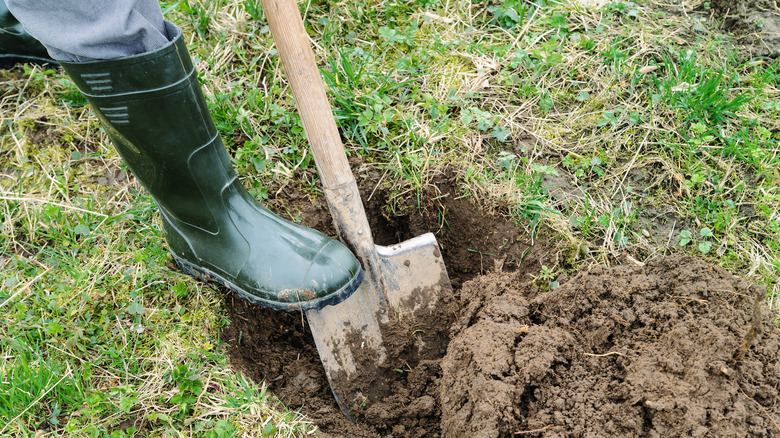Planting Trees Just Got A Whole Lot Easier With This WD-40 Hack
If you want to plant a few more trees before the end of the season, then you need a few supplies handy in order to do so. Specifically, you need a shovel to dig an appropriately sized hole for your new addition. However, you don't need to break your back trying to get through compacted dirt or heavy clay. Instead, you can make your shovel easily glide into the soil without much effort at all, and all you need is some WD-40 to accomplish the task.
You might be thinking, "Isn't that just for squeaky door hinges and rusty bike chains?" While WD-40 does indeed tackle those tasks, it's also invaluable in the garden. WD-40 can help make big changes to your yard, and one way it does so is by greasing shovels so they glide effortlessly into the dirt, making digging so much easier. Here's how to use it to plant a tree.
How to use WD-40 to plant a tree
To pull off this hack, grab your can of WD-40 and use the nozzle to lubricate your shovel. Pay special attention to the tip, sides, and dip of the tool. These are places where dirt tends to stick to most, so greasing those areas will make your job easier. Wait a minute or two for the spray to dry, and then proceed with your task. The lubricating nature of the spray will reduce friction, making it easier to pierce through the dirt, especially if it's clay.
In addition to that, it will also help the shovel come out cleaner. That's because WD-40 isn't just a lubricant; it's also a water displacer. That's one of the main reasons why it keeps rust at bay — it repels moisture from the surface it's sprayed on. And since there's usually some moisture in the ground, the shovel will be able to part the wet dirt easier, and clumps of it won't stick to the metal.
One thing to keep in mind is that WD-40 can damage plants and hurt wildlife due to its toxicity. Because of that, you don't want to use it to spray directly onto the dirt, grass, or any animals nearby. However, if you let the spray dry on the shovel before piercing the ground, it should not negatively contaminate the dirt. But if you prefer to be cautious, avoid using this hack in the vegetable patch, where food will be grown.
